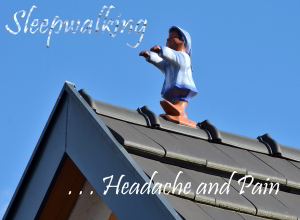Sleepwalking, Headache, and Pain
Just how common is sleepwalking? Estimates range quite a bit, although a study in 2012 suggested that almost 30% of us walk in our sleep sometime in our lives.
Those who sleepwalk on a regular basis do tend to complain that they’re sleepy during the day. But there may be a lot more to the condition than we realize. Sleepwalking is closely related to other disorders, including depression, headache, and migraine.
The relationship between sleepwalking and migraine is a complex one. For example, depression and migraine are also linked. Magnesium levels are linked to both migraine and sleepwalking. Changing sleep schedules are linked to both. Certain medications may affect both, such as antihistamines, mild tranquilizers and a few antipsychotics. Obstructive sleep apnea is also strongly related to both.
This spring a report on a fascinating sleepwalk study was released. The authors of the study confirmed that migraine and headache were highly associated with sleepwalking. (This doesn’t mean that most migraine patients walk in their sleep. It does mean that if you sleepwalk you are much more likely to have migraine.)
But a fascinating twist is that patients were very unlikely to experience pain while sleepwalking. In other words, banging your knee on the table while you’re sleepwalking is unlikely to even wake you up. In fact, one patient fell off his roof and broke his leg, but didn’t wake up until the morning!
There are obviously many mysteries about pain still to be solved. However, there are some key things you can do about sleepwalking, especially if you have migraine as well:
- Consider taking a magnesium supplement.
- Get into a regular sleep schedule, and dedicate more time to sleeping/getting to sleep. Take some low-stress, low-light, low-technology time in the evening.
- Consider seeing a sleep specialist, who can help you look into issues such as sleep apnoea (apnea) and restless leg syndrome.
- Take a walk before bed (yes, really!).
Focusing on your sleep may actually help relieve migraine and stop sleepwalking. It’s funny in fiction, but it needs to be taken seriously in real life.
For more on the recent study into sleepwalking and pain, read Sleepwalkers feel no pain, remain asleep despite suffering injuries from ScienceDaily. Also check out this Sleepwalking Overview from emedicinehealth.

StammosFanLover
6 November 2015 @ 6:13 pm
@migraine_blog I Don’t Sleep Walk But I Have Something Sleep Seizure’s! I Think That’s Convulsions During The Sleep!